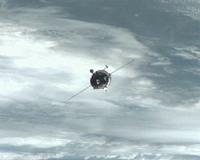 |
Washington (AFP) Sept 14, 2010 US aerospace giant Boeing has won a 1.2 billion dollar contract extension with NASA to support the International Space Station, both parties said Tuesday. "The extension brings the total contract value through the end of fiscal year 2015 to 16.2 billion dollars," the National Aeronautics and Space Administration said. Boeing will help sustain the station's hardware and software. "Boeing's knowledge of the International Space Station allows us to safely fly and operate the station to 2015, set the stage to enable ISS operations until 2020, and potentially extend operations through 2028," said Joy Bryant, Boeing's vice president.
earlier related report The NIH Biomedical Research on the International Space Station (BioMed-ISS) awards are the next step in a new partnership to apply the national laboratory to research that complements NASA's own space studies. The NIH studies include research on how bones and the immune system weaken in space. "This marks the beginning of a new era in microgravity-based research with the International Space Station turning the corner from construction to use as a new national laboratory," said Mark Uhran, assistant associate administrator for space station, NASA Headquarters in Washington. In 2005 Congress recognized the immense promise the station holds for U.S.-led science and technology efforts. It opened the U.S. portion of the facility to federal agencies, university and private sector researchers by designating the station as a national laboratory. In addition to NIH, NASA has similar research agreements with the Departments of Defense, Agriculture and Energy and the National Science Foundation. Scientists will conduct their experiments under a two-stage mechanism. The first is a ground-based preparatory phase to allow investigators to meet select milestones and technical requirements. The second is an experimental phase on the space station that will include preparing the experiments for launch, working with astronauts to conduct them on orbit and performing subsequent data analyses on Earth. "BioMed-ISS offers a novel opportunity for gaining scientific insights that would not otherwise be possible through ground-based means," said Stephen I. Katz, M.D., Ph.D., director of the NIH's National Institute of Arthritis and Musculoskeletal and Skin Diseases and NIH liaison to NASA. "The beauty of this initiative is that it offers an unprecedented opportunity for benefitting human health on earth, while leveraging the American public's investment in the ISS." NIH is hosting three rounds of competition for the initiative. The first round of grants for the ground-based phase, totaling an estimated $1,323,000, has been awarded as follows: Paola Divieti, M.D., Ph.D., Massachusetts General Hospital/Harvard Medical School, Boston: Weight-bearing activities contribute to the development and maintenance of bone mass, while weightlessness and immobility, as experienced by the astronauts and bedridden and immobilized patients, can result in bone loss and a weakened skeleton. Osteocytes, the most common type of bone cell, are believed to have gravity-sensing abilities. These cells play a key role in bone remodeling, a process that is vital to skeletal health. In studying osteocytes in a gravity-free environment, Divieti aims to uncover new therapeutic targets for osteoporosis and related bone diseases. Millie Hughes-Fulford, Ph.D., Northern California Institute for Research and Education, San Francisco: The immune system, which protects the body against foreign substances, is suppressed in space. A reduction in the immune response also occurs in the elderly, who, like the astronauts, are at increased risk for infection. As a former astronaut, Hughes-Fulford, a former payload specialist on the STS-40 Spacelab Life Sciences shuttle mission in 1991, aims to apply lessons learned from studies of immune cells in microgravity to a new model for investigating the loss of immune response in older women and men. Declan McCole, Ph.D., University of California, San Diego: The movement of toxins from intestines to other organs in the body is a major source of illness in the United States. A major factor in disease stems from the ability of toxins to compromise the natural barrier function of cells in the gastrointestinal tract. Using microgravity based three-dimensional cell culture models, McCole plans to generate insights regarding the barrier properties of the intestines, and explore how the absence of gravity affects a toxin's ability to diminish this barrier.
Share This Article With Planet Earth
Related Links Station at NASA Station and More at Roscosmos S.P. Korolev RSC Energia Watch NASA TV via Space.TV Space Station News at Space-Travel.Com
 Russian cargo vessel docks at International Space Station
Russian cargo vessel docks at International Space StationMoscow (AFP) Sept 12, 2010 A Russian cargo vessel docked Sunday at the International Space Station with 2.5 tonnes of supplies and material, a spokesman for the Russian space flight control centre said. The Progress M-07M vessel contained food, water, fuel and scientific material including mushrooms and bacteria to be used for experiments. The last Russian cargo vessel docked at the ISS on July 4, after a failed a ... read more |
|
| The content herein, unless otherwise known to be public domain, are Copyright 1995-2010 - SpaceDaily. AFP and UPI Wire Stories are copyright Agence France-Presse and United Press International. ESA Portal Reports are copyright European Space Agency. All NASA sourced material is public domain. Additional copyrights may apply in whole or part to other bona fide parties. Advertising does not imply endorsement,agreement or approval of any opinions, statements or information provided by SpaceDaily on any Web page published or hosted by SpaceDaily. Privacy Statement |